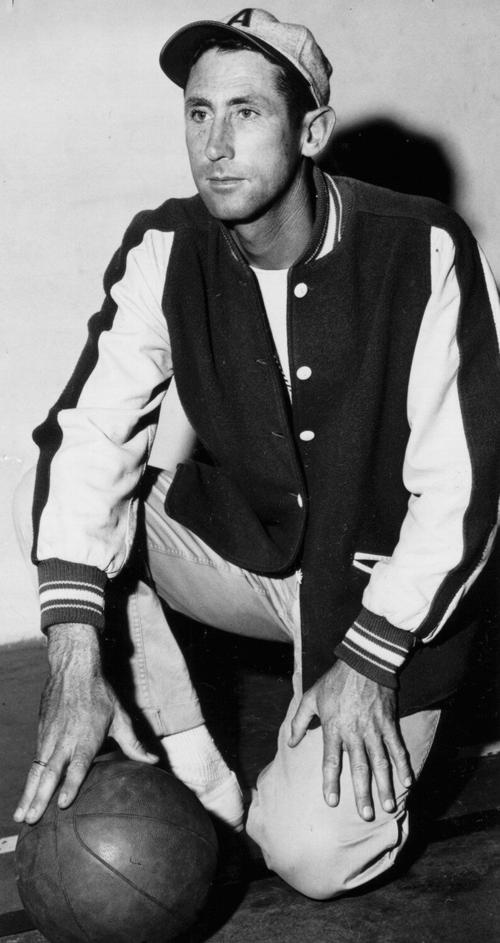On a sunny winter afternoon in 2003, I parked in front of McKale Center and saw George Genung and his wife, Lyle, stuck in line at the ticket office. George, then 80, was in a wheelchair.
The Wildcats were ranked No. 1 most of that basketball season and Genung hoped to get tickets to see his alma mater play the Sun Devils.
“They’re sold out,” he told me. “I’ve got my lifetime pass but it no longer works.”
He showed me the so-called “lifetime pass,” which the UA distributed to prominent former athletes in the late 1950s, passes that, by the 1990s, were often ignored. If ever the Wildcats had a “prominent former athlete,” it was George Genung, who had grown up with my father-in-law, classmates at Tucson High School.
Genung earned 11 varsity letters during his schoolboy days at Arizona, five in basketball, five in baseball and another in swimming. He was the captain of two Border Conference basketball championship teams, and also captain of Pop McKale’s baseball team..
More than that, Genung was an American hero, whose World War II experiences in Gen. George Patton’s Third Army were so profound I offered to write a book about Genung, my father-in-law and many of their UA teammates, some of whom were killed in the War.
And here he was, rebuffed in an attempt to get tickets to the UA-ASU game.
“They’re not letting you in?” I asked, incredulous, and a little steamed. “You should be in the front row.”
In a bit of good timing, the UA’s associate athletic director, Chris Del Conte, emerged from McKale Center. Del Conte stopped to say hello; I introduced him to Genung, a modest man who actually apologized for causing a logjam at the ticket window.
To his everlasting credit, Del Conte took charge of the situation, quickly understood Genung’s legacy, and in a few minutes arranged for George and Lyle Genung to attend the upcoming UA-ASU game.
Genung died in 2006. I attended the memorial service at Amphitheater High School’s gymnasium, which was named after Genung in 1992. I think about him every time I drive by the school, about the 30 years he served as Amphi’s basketball coach, about his singular sports career at the UA, but mostly about his World War II days.
On Veterans Day, I often find myself thinking of the young George Genung, son of a copper miner from rural Aravaipa, who had been a bat boy for McKale’s baseball teams of the 1930s.
After getting to know Genung and many of his former UA teammates and World War II veterans, I told him of my idea to write a book about him about their war experiences. He invited me to his house a few blocks east of Amphi on Prince Roadi.
It wasn’t your typical Q&A session. It was unforgettable.
After we discussed Genung’s remarkable ball-playing days, the conversation turned to his near-death experiences in the Battle of the Bulge, and of Adolf Hitler.
“We were among the first American troops to cross the Elbe River and meet the Russians in Germany,” he said. “We knew then the Germans were all but defeated, but it was still a very dangerous mission. At that time, I just wanted to survive and get back to Tucson.”
Over the next few weeks in May 1945, George Genung was witness to some of the most memorable events of World War II, or any war..
“We saw the death camps, Dachau and others. It was horrifying,” he told me. “We must’ve taken 10,000 German troops prisoner. Many were eager to get favorable treatment, so they gave us some of their equipment as souvenirs.’
Genung got up from his chair and took me down a flight of stairs to a room with several large chests. “Look at this,” he said.
From one chest he pulled out a standard-issue Wehrmacht rifle from the 1940s. Scripted on the barrel of the rifle were the words “GERMANY FOREVER.”
“A prisoner-of-war gave it to me,” he said.
He next pulled out the overcoat of a German S.S. officer. On the sleeve, were the words “ADOLF HITLER.”
I was speechless.
“A few days after we entered German territory, my group was allowed to go up to the ‘Bird’s Nest’ – Hitler’s Bavarian mountaintop retreat In Berchtesgaden. He had killed himself a week or two earlier. A lot of the guys celebrated and drank from Hitler’s large wine cellar. But I was emotionally exhausted. I just wanted to go home.”
When Genung returned to Tucson in December 1945, he immediately rejoined the U.A basketball team. His teammates, Jim Negri and Fred W. Enke, had recently returned from the War. Both shared stories of near-death with me.
“We were all thankful just to be alive,” said Genung. “When I finally got home, finally got off the train in downtown Tucson, I bent over the kissed the ground.”
Born in 1922, George Genung would have turned 100 this year. His accomplishments and legacy will surely endure another 100 Veterans Days.
McKale Center was built at the University of Arizona in the early 1970s. There have been updates through the years.





